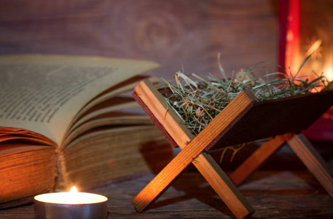 by Pastor Jeff To everyone who has, more will be given and he will have an abundance. But that one who has nothing even what he has will be taken away" Mt 25:29 - The parable of the talents Imagine looking under the Christmas tree one Christmas and seeing a mountain of presents.....it looks as though there are presents for everyone in your family and enough to make even the grumpiest child happy. The presents are big and they are wrapped beautifully. There are huge bows on each one of them and a card with with the names to whom they are about to be given. And there are five presents with your name on the cards! Huge presents! Well wrapped and ready to be opened by you....everyone in the family is excited. Your siblings are jumping up and down! One by one each of the presents gets opened.....except yours. Your siblings are excited! They are looking at their presents, playing with their presents, learning how to use their presents... But you have decided not to open yours. Why? Can't you see how much fun your siblings are having with the gifts that have been given to them? The joy in their hearts and in their eyes as they play with one another with the gifts that have been given them? Your brothers and sisters look at you like there's a screw loose in your head. Who wouldn't want to open such magnificent gifts as these? It is so much fun guessing what is inside and then ripping the paper open! It's a blast to learn how to use the gifts that have been given to you. And it is so much fun sharing what gifts you have and playing together with your brother and sister. Your parents are confused too. They went out together to secure just the perfect gifts for you. Gifts that reflected your personality and style. Gifts that would help you become more of who you are and bring joy to your life and your world in using them. But apparently..... you prefer to look at your gifts. To simply admire the way that they're wrapped. To know that your parents gave you the best gifts in the world but not know exactly what they are. Then you hide them away in the basement closet thinking that maybe 30 or 40 years from now you can pull those presents out and show your parents that you still have them. Certainly your parents will be impressed that you still have these gifts just the way they were given to you - unopened, unused, still with the pretty paper, card and bough........right? God (and the children of God too!) scratches his head a lot about you and I when God thinks about all the gifts God gives each one of us. Such beautiful gifts, given with care and attention to detail. Gifts that reflect our personality and style. Gifts that would help us become more of who we are and bring joy to our life in using them. But we leave them unopened, undiscovered, un-played with. We hide God's gifts away, thinking that if we can just keep the gifts of God looking the way God gave them to us that it will count for something. But it doesn't count. Not for anything. Unless you open and use the gifts that God has given you, all that present is is an unused future life of joy - a life that could have been- wrapped up in a pretty box. Have you opened all your presents? Ripped open the paper and learned how to use all the cool things God has given you? Shared your joy with the world full of other people who are sharing their joy with the gifts that God has given them? Remember, to those who have received many gifts, even more gifts -joy, satisfaction, community-will be given in using those gifts. But if you never open your box, forget about the extra gifts. Because if you don't open the box it will feel like even the gifts God give you are being taken away… Christmas Blessings, Pastor Jeff  by Pastor Barb It was a Saturday, like many others. Our Violence Prevention Youth Group was at church, doing some cleaning and other tasks to improve the environment in our building. Then they went over to North Market for lunch, and talked about their ultimate goal: violence prevention. After lunch they scattered homeward. Over half of the group lives in the same building, a few blocks from church. There are a lot of kids in the building, and their play space is the yard around them. On this typical Saturday evening, some kids were outside playing. Some of our youth were in their apartment watching a movie, with their younger siblings. They heard gunfire. It sounded like it was about a block away. Then they heard cars screeching, coming nearer. Then more gunshots. Then a loud boom. Out the window, they could see that the boom had been a car crashing into the building next door. A man got out of the car and ran toward the alley. Another car crashed into a parked car. Finally, sirens. A police car, an ambulance. Flashing lights. And a body on the ground. All of this took place within clear view of the apartment windows. The kids outside saw even more. When the first shots rang out, our youth who’d been watching a movie asked if they should get on the floor. That was their first reaction. What does that tell us? That they’ve been through this before; that they understand gun violence as part of their environment; that they know bullets sometimes come through apartment walls. Had they seen a body on the ground before? Or how the first responders or the coroner deal with the scene? More importantly, what effect does it have on adolescents and younger children to witness such things? Have they developed a “been there, done that” attitude, or are they traumatized by what they’ve seen? Both are problems for their development and well being. If we need any more reasons to work to end violence in our community, here’s a big one: for the sake of the children. Since last winter I have been learning about the effects of “adverse childhood experiences” (ACES) on children and youth. This effort was motivated by the kids around me, what they said; what I saw in their behaviors, and in the reactions of adults around them. I was troubled that frequently, when kids would “act out” in public, people would assume that something was deficient in the kid, or that their parents were inept. I’ve learned some important things in the past year. Here are two important ones: (1) There are no purposeless behaviors. If a kid (or anyone) acts out, it’s a way of expressing something, when one knows no other, more constructive means of expression. (2) Instead of thinking, “What’s wrong with you?” about that person, maybe we should think, “What happened to you?” And, far too often, what has happened to a kid who is acting out is some form of adverse experience, or trauma. In our community, simply living with the awareness of gun violence around them is an adverse childhood experience. Knowing that there is risk of harm in going outside to play, walking home from school, or any other ordinary daily activity is itself traumatic. This is not just emotional damage. The chemicals that the body releases in response to trauma involve the brain in negative ways. If these chemicals wash through the body too often, the developing brain of a kid will change in ways that can affect behavior. If these effects aren’t recognized and addressed, a kid can grow up to be an adult who acts out. The anger, distress, fear, frustration, and all the other pent-up things that early trauma generates will emerge in some way, sometime. I have no doubt that a lot of people who sit in prison today ended up there because their “stuff” emerged in anti-social ways. As one local resident said recently, after hearing of a violent event that took place in front of kids, “I see kids in my community traumatized over and over again…and they never get help dealing with the emotional toll. They grow up to be angry, hurtful people.” There is good news arising out of this day as well. In the building where so many witnessed the events of this day, the residents came together for a meeting with building management. The immediate response would be to send in therapists and counselors to help witnesses to process what they’d seen. The longer-term response would be to consider more safety features like motion-detector lighting, effective fencing of the yard, etc. And, there is interest in holding another meeting. Because we are organized for violence prevention, that meeting is likely to be held at The Camden Promise. All of the youth in our violence prevent group have witnessed or experienced violence. Some of them witnessed it on this Saturday. These young people have parents who are knowledgeable, concerned, and involved. They talk with their kids. Because we have a violence prevention group, the youth also have had opportunities to speak openly, together, with caring adults (some of whom are city and state officials), to process what they’ve seen, to find common ground, to share common experiences, and to think creatively about solutions. These include directing the energies of the youth into positive, constructive engagement and service in the community. A supportive community infrastructure is being built, one step at a time, to support and strengthen residents against violence and trauma, and ultimately to put an end to the violence altogether. This is for the benefit of the whole community; but, most of all, it is for the children.  by Pastor Barb The writer Aldous Huxley said, “After silence that which comes nearest to expressing the inexpressible is music.” Hymns and choral music are at the heart of Lutheran tradition. When mere words are not enough, raising our voices together in song elevates our words into art and prayer, and sends them heavenward. Most of the time, Lutheran hymns are strong on praise, recounting the history of God’s work, giving thanks, and testifying to God’s faithfulness and our own efforts to be faithful. When Advent begins, the music takes a sudden turn, to a minor key. The plaintive cries of “O Come, Emanuel” reveal our yearning, our need, and our hope. We revisit God’s promises, as foretold by the prophets, of a messiah, a savior, and we cry out to God to see that promise fulfilled. “O come, O come, Emmanuel, and ransom captive Israel, that mourns in lonely exile here, until the Son of God appear.” These days, we might feel that need more than ever, because our world sometimes seems to be spinning out of control. I love the music of Advent, especially the “O Antiphons,” from which the verses of “O Come Emanuel” are drawn. The antiphons are centuries old, and in some traditions are recited as prayers each day in the last week of Advent. Each begins with “O”, which adds to our sense of urgency and desperation in crying out for a savior. Each uses a different title for Jesus, and so they remind us of all that God will do through Christ, when he comes. Each ends with an “ask”: “Stretch out your hand; show us the way; lead us to freedom.” For me, singing these in a minor key conveys the sense that we, too, “mourn in lonely exile here,” as we yearn for the promised messiah. Advent is a wonderful time for daily devotions. Consider praying these O Antiphons each day from December 17 to 23. Find the verse of “O Come Emanuel” that draws on that day’s prayer. Then, ponder how God might already be actively at work, doing what we have asked for. Think about what you see in the world that might be signs of God’s activity. Share your thoughts with family. Invite the kids to participate. Have the neighbors over to talk. Advent is a time of active waiting. As we wait, we prepare ourselves for the time when the promise is fulfilled: for the coming of the Christ child. |
Archives
March 2020
Categories |
 RSS Feed
RSS Feed
